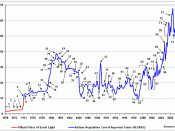Why Do Gas Prices Change?
When thinking of modern technology, it is hard to think of anything that does not require some type of oil to power it. As a society, we are completely dependent on oil. Oil was formed millions of years from the remains of animals and plants in a marine environment. Layers of mud covered the remains while heat and pressure helped turn the remains into crude oil, or petroleum. The word "petroleum" means "rock oil" or "oil from the earth." The world's top 5 petroleum-producing countries are Saudi Arabia, the United States, Russia, Iran, and China. After the crude oil is removed from the ground, it is sent to be refined into petroleum products. One refined barrel of crude oil produces 19.4 gallons of motor gasoline. "Because crude oil is the largest non-tax cost component of a gallon of gasoline, the price of gasoline is determined largely by the demand and supply of crude oil worldwide."
Anyone who has driven a car knows the frustration of fluctuating and high gas prices. One day gas is cheap and the next day it shoots up by 5 cents. "The cost to produce and deliver gasoline to consumers includes the cost of crude oil to refiners, refinery processing costs, marketing and distribution costs, and, finally, the retail station costs and taxes. The prices paid by consumers at the pump reflect these costs, as well as the profits (and sometimes losses) of refiners, marketers, distributors, and retail station owners." With gas prices reaching as high $1.67 a gallon in San Francisco during the last week of April, one can't help but wonder what makes gas prices change? The same factors that make many prices change, supply and demand.
Organization of Petroleum Exporting Countries (OPEC) was set up to bring "stability...


